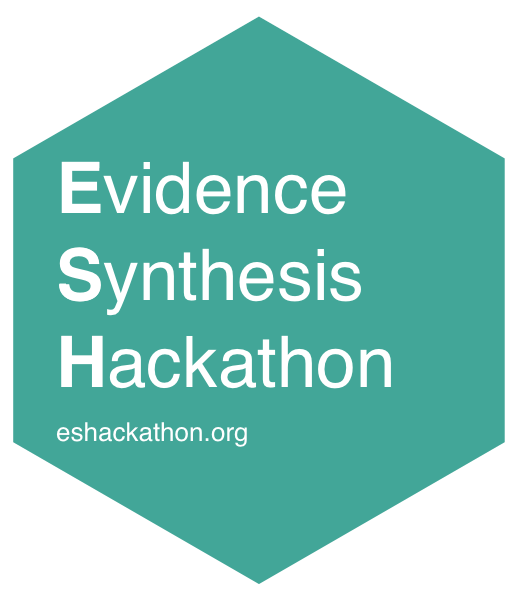Described herein, the Evidence Synthesis Hackathon (ESH) refers to an event series, consisting of in-person or online activities undertaken by voluntary groups of individuals (Participants). The ESMARConf (Evidence Synthesis and Meta-Analysis in R Conference) is the ESH’s flagship annual online conference. Participation in both ESH and ESMARConf are always free and do not require any form of payment, though attendance at individual events may be limited to a specified number of Participants by the Organisers. Participants at ESH events are expected to contribute in a meaningful way to group activities. The Organisers of ESH are currently (as of 2025) Neal Haddaway, Matthew Grainger, Fiona Campbell and Matt Lloyd and the organisers of ESMARConf (as of 2025) are Neal Haddaway, Matthew Grainger, Ryan Field and Rafael Jose Vieira.
Aims and objectives of the Policy
The Evidence Synthesis Hackathon (ESH) and the organisers of ESMARConf are committed to equality and ensuring an accessible workflow, and equal and fair treatment of its participants interacting during the conference.
In the UK, The Equalities Act 2010 identifies a list of “protected characteristics”. It is illegal for an organisation to harass or discriminate against anyone because of their age, disability, gender reassignment, marriage or civil partnership, pregnancy or maternity, race, religion or belief, sex, or sexual orientation. The organisers of the ESH oppose all forms of unlawful and unfair discrimination and will not, through coordinating activities or by allowing or endorsing behaviour of its participants in their activities associated with the ESH, discriminate on the grounds of any protected characteristics.
The ESH and ESMARConf seeks to foster an accessible working environment free of discrimination and prejudice. All participants will be treated fairly, with respect, and will be given equal opportunity in every aspect of their work within the group.
Accessibility
The organisers of the ESH and ESMARConf seek to ensure the group’s activities are accessible as possible to its participants. To that effect, the organisers will ensure the following:
Communications will be primarily in writing in English, via email or online digital documents. Translation services will be linked to wherever possible. Participants will be encouraged to participate by commenting on and suggesting amendments to working documents, meeting minutes, and communications media (including website text and social media campaigns). Where webinars or online meetings are held that rely on audio communication, minutes will be recorded and provided to all participants, with an invitation to contribute by providing written responses and queries/clarifications, to support participation from all participants. Recordings of presentations will be transcribed in English using automated subtitling services and, where possible, these will be manually checked by a subject expert. These verified subtitles can then be automatically translated into a wide range of languages. At present, we use YouTube transcription and translation services. Translation and signing service costs will be included and prioritised in all grant applications as far as budgets allow. All feedback can be provided in whatever format (verbal, written, etc.) participants feel comfortable using, and may be given anonymously via de-identified forms or anonymous email accounts.
Code of Conduct
People will be treated with dignity and respect regardless of age, disability, gender reassignment, marriage or civil partnership, pregnancy or maternity, race, religion or belief, sex, or sexual orientation. At all times people’s feelings will be valued and respected. Language or humour that people find offensive will not be used, e.g. sexist or racist jokes or terminology which is derogatory to someone with a disability. No one will be harassed, abused or intimidated on the grounds of his or her race, nationality, gender, sexual orientation, gender reassignment, disability or age. Incidents of harassment will be taken seriously. Raising a concern/complaint Any participant or organiser of the ESH or ESMARConf who feels they have been treated unfairly on the grounds of a protected characteristic are encouraged to raise their concerns with an organiser (anonymously, if desired).
Complaints can be submitted by email to any of the organisers or using this anonymous form.
The organisers will investigate the complaint, listening to all participants involved. (If the complaint is against an organiser, that member will not be involved in the investigation).
If the complaint is against a particular individual, this person will have the opportunity to express their point of view. The person making the complaint will also have this opportunity. If the complaint is against the ESH or ESMARConf as a whole, the organisers must work to ensure that such discrimination is not repeated in the future, and must inform the participants of how they propose to do this.
Any decision to exclude a person from the ESH or ESMARConf due to discriminatory or harassing behaviour will be made with reference to this Policy. The ESH and ESMARConf organisers will support people who feel they have been harassed or discriminated against, and will not victimise or treat them differently as a result.
This document
All participants of the ESH and ESMARConf will be notified of the existence of this Accessibility Policy and Code of Conduct, and informed that they are obligated to comply with its requirements and promote fairness whilst acting as participants of the conference.
This document was established in July 2020 and updated in May 2025 (find a “living version” here)
